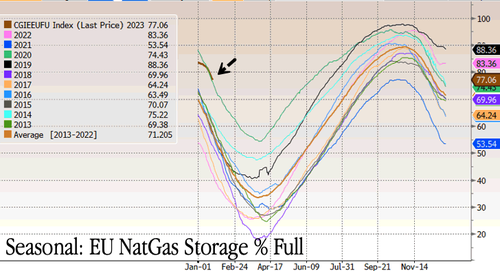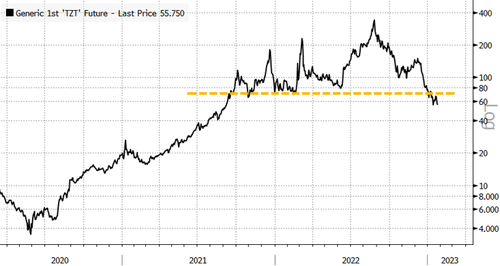Steve Bull's Blog, page 134
January 27, 2023
Renewable Power Projects Slow In US Over High Costs And Community Opposition
The installation of wind and solar power projects is slowing down in the United States, with some projects being canceled over persistent cost issues and community animosity.
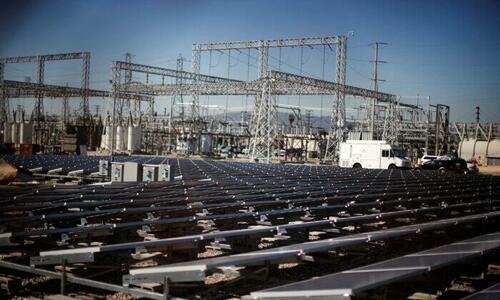 Solar panels are seen next to a Southern California Edison electricity station in Carson, Calif., on March 4, 2015. (Lucy Nicholson//File Photo/Reuters)
Solar panels are seen next to a Southern California Edison electricity station in Carson, Calif., on March 4, 2015. (Lucy Nicholson//File Photo/Reuters)New utility-scale solar installations are estimated to have fallen by 40 percent in 2022 compared to the previous year, according to a report from research firm Wood Mackenzie. Utility-scale solar deployments in the third quarter of 2022 were 36 percent lower when compared to Q3, 2021, and 9 percent lower compared to Q2, 2022.
“The low installation figures are the result of previous project delays and continued supply chain constraints,” the report said.
During the third quarter, new wind installations are calculated to have crashed by 77.5 percent compared to the same period a year ago based on another report by S&P Global Market Intelligence. Between July and September, U.S. developers only added 501 MW of new wind power capacity, down 22 percent from Q3, 2021.
“No other third quarter saw lower wind capacity additions since at least 2015. The 4,500 MW of new wind capacity added in the first three quarters of 2022 is less than half of that added by the end of 2021’s third quarter, 9,223 MW,” the report states.
High costs are said to be one of the reasons for canceling some of the renewable energy projects. For instance, the Midcontinent Independent System Operator (MISO) canceled around 245 renewable energy projects in the four years between January 2016 and July 2020 which had reached advanced stages of development.
The 245 projects accounted for 40 percent of total projects by the organization at the time. According to MISO, issues with congestion and costs related to grid upgrades were the main reason behind withdrawing the projects, according to the Institute of Energy Research (IER).
Community Opposition, China Slave Labor
…click on the above link to read the rest…
Europe’s Energy Crisis Leaves Almost All Of Pakistan Without Power
The long-awaited winter energy crisis has finally hit…but it wasn’t in Europe after all. On Monday, almost the entirety of Pakistan was left without power when a misguided energy saving strategy by the government backfired. Runaway inflation, a severely weakened currency, and rapidly emptying foreign exchange reserves have left Pakistan on the brink of economic collapse. The country of 230 million people is plagued by overdue energy payments, and was seeking to cut costs by lowering energy use when the plan went off the rails, leaving people across the country without power or water for more than 12 hours.
Pakistani officials had planned to save on energy costs by turning off electricity across the country overnight. Nighttime has the lowest usage hours for energy in Pakistan, where winters are relatively mild. The problem came when technicians tried to reboot the electric system in the morning, and found out that the infrastructure wasn’t capable of booting up the entire nation’s energy grid all at once. Major cities, including the capital city of Islamabad, as well as smaller cities and towns across the country were left in the dark for 15 hours on Monday, lasting into the night.
“As an economic measure, we temporarily shut down our power generation systems” Sunday night, Energy Minister Khurram Dastgir told local media. He went on to explain that when engineers tried to turn the systems back on, a “fluctuation in voltage” occurred, which “forced engineers to shut down the power grid” stations altogether.
…click on the above link to read the rest…
January 26, 2023
NATO’s ‘war against Russia’ inches ‘closer to direct conflict’
“We are fighting a war against Russia,” German’s Foreign Minister says, as the US and Germany authorize tank shipments, and new dangers, in the Ukraine proxy war.
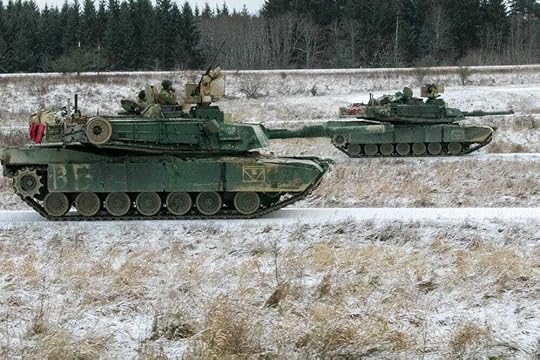 (US M1 Abrams tanks at a training site in Germany, 2018. U.S. Army photo by Staff Sgt. Sharon Matthias / 22nd Mobile Public Affairs Detachment)
(US M1 Abrams tanks at a training site in Germany, 2018. U.S. Army photo by Staff Sgt. Sharon Matthias / 22nd Mobile Public Affairs Detachment)Since the first week of Russia’s invasion of Ukraine, French President Emmanuel Macron has repeated a mantra on behalf of his NATO partners: “We are not at war with Russia.”
Nearly one year in, that notion has officially been dispelled.
“We are fighting a war against Russia,” German Foreign Minister Annalena Baerbock said this week.
Baerbock was trying to assuage NATO allies’ frustration over German reluctance to send Leopard 2 tanks into Ukraine. She can now claim vindication. In a reversal of its initial position, the German government has announced it that will deliver Leopard 2 tanks to the Ukrainian army.
To overcome German Chancellor Olaf Scholz’s jitters, the White House engaged in an about-face of its own, approving the shipment of 31 US-made M1 Abrams tanks to Ukraine. Scholz had insisted on conditioning any German tanks to a similar US commitment. Up until this week, Pentagon chief Lloyd Austin was “dead set against providing” the M1s, and declared there to be “no linkage between providing M1s and providing Leopards.” Austin had argued that the M1s are too cumbersome for Ukraine, requiring costly jet fuel, heavy maintenance, and lengthy training.
Just last month, a senior US defense official declared that “even one M1 was out of the question,” according to the Washington Post. When used by US troops in Iraq, the M1s were “hard for us to sustain and maintain,” the official noted. For Ukraine, “it would be impossible.”…
…click on the above link to read the rest…
Germany Still Years Away From Replacing Russian NatGas, Official Admits To “Unspoken Strategy To Pay Crazy Prices”
Some European politicians and economists are breathing a sigh of relief after mild temperatures, increasing liquefied natural gas shipments, and above-average natural gas stockpiles have so far averted a worsening energy crisis this winter. Other politicians believe the energy crunch won’t be over for many years.
“Gas storage is up and gas prices are down. Inflation is falling and uncertainty is declining,” Deutsche Bank AG wrote in a note this week, adding, “We can afford to be more optimistic.”
As of late, Europe’s biggest economy, Germany, has seen an improvement in business outlook as recession fears recede, according to data from the Ifo Institute, a Munich-based economic researcher.
Ifo President Clemens Fuest told Bloomberg TV:
“The most important risk for the German economy was a gas-rationing scenario … and that risk is off the table now.”
There’s a lot to be happy about in Europe: Dutch front-month NatGas, the continent’s benchmark, slid as much as 5% to 55 euros a megawatt-hour today, the lowest level since late 2021. Prices have collapsed by more than 83% since peaking at 311 euros a megawatt-hour last August.
However, the optimism could be short-lived because Germany is years from entirely substituting Russian NatGas flows with LNG shipments.
Last week, Chancellor Olaf Scholz told Bloomberg that German learned a hard lesson in its addiction for cheap Russian NatGas. He said the country is now rejiggering supply chains that will increase capacity for LNG imports at major ports.
A new report via the country’s Economy Ministry shows Germany will install 56 billion cubic meters of domestic LNG import capacity by 2026. By 2030, capacities will increase to 76.5 billion cubic meters or about 80% of total German NatGas consumption in 2021.
…click on the above link to read the rest…
January 25, 2023
German Foreign Minister Just Said The Quiet Part Out Loud On Ukraine
German Foreign Minister Annalena Baerbock bluntly stated in fresh remarks that Western allies are fighting a war against Russia. The remarks came during a debate at the Parliamentary Assembly of the Council of Europe (PACE) on Tuesday amid discussions over sending Leopard 2 tanks to Ukraine.
While Baerbock’s words were largely ignored in mainstream media, a number of pundits on social media noted with alarm that the German foreign minister just essentially declared war on Russia.
Ironically other German officials have long sought to emphasize their country is not a party to the conflict, fearing uncontrollable escalation.
Contradicting this official stance, Baerbock said the quiet part out loud, and introduced the comments with: “And therefore I’ve said already in the last days – yes, we have to do more to defend Ukraine. Yes, we have to do more also on tanks.”
And that’s when she asserted: “But the most important and the crucial part is that we do it together and that we do not do the blame game in Europe, because we are fighting a war against Russia and not against each other.”
Interestingly, both Chancellor Olaf Scholz and his former defense minister who recently resigned, Christine Lambrecht, have been seen as weak on arming Ukraine – repeatedly declaring an unwillingness to get pulled deeper into the proxy war aspect to the conflict. But now it seems the more hawkish Baerbock is willing to at this point be much more open with the reality of what’s happening.
Russian Foreign Ministry spokeswoman Maria Zakharova seized on the comments, saying this is yet more proof that the Western allies were planning a war on Russia all along…
“If we add this to Merkel’s revelations that they were strengthening Ukraine and did not count on the Minsk agreements, then we are talking about a war against Russia that was planned in advance. Don’t say later that we didn’t warn you,” Zakharova said.
One thing is for sure, things are moving fast…
Hope, on the Balance of Probabilities
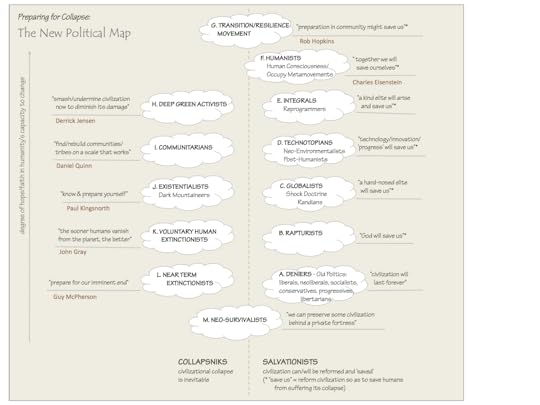
my now-slightly-outdated map of worldviews about collapse; right-click and open in a new tab to see it full-sized
It’s interesting to listen to social philosopher Daniel Schmachtenberger try to reconcile his assessment of the state of the world with his vehement insistence that we have to try as hard we possibly can to avert the ‘metacrisis’ that threatens to bring about the collapse of human civilization and the extinction of most or all life on earth, including humans.
In a recent video, he said:
How can evolutionarily nasty chimpanzees with a high orientation for conflict and irrationality, with nuclear weapons and AI and synthetic biology, with a history of using technology in conflict-oriented and harm-externalizing ways, how can 8 billion of us with exponential tech [increasingly available to all] do a good job of governing that much power? It doesn’t actually look that promising.
Yet he insists that “we cannot know for certain” that we are fucked (or that we are not), so we each have a responsibility to do what we can, working with others, to pull us back from the brink.
His argument reveals a curious quirk about humans and our relationship to complexity, uncertainty, and hope. We seem completely preoccupied with what John Gray calls “the needs of the moment”, and it is clear that this preoccupation has directly produced the metacrisis (a combination of many, unintended, crises and system collapses — economic, ecological, political, social, health, educational, resource, technological, and, for some, spiritual/religious) in which we find ourselves. Yet we continue to cling to hope for our future when all logic says it’s unfounded.
…click on the above link to read the rest…
January 24, 2023
Extreme heat could put 40% of land vertebrates in peril by end of century
Study shows ‘disastrous consequences for wildlife’ if human-caused emissions push global temperatures up 4.4C
 A female desert bighorn sheep in the Joshua Tree National Park, California. Such areas would be among the worse impacted if global emissions are not cut. Photograph: Michael S Nolan/Alamy
A female desert bighorn sheep in the Joshua Tree National Park, California. Such areas would be among the worse impacted if global emissions are not cut. Photograph: Michael S Nolan/AlamyMore than 40% of land vertebrates will be threatened by extreme heat by the end of the century under a high emissions scenario, with freak temperatures once regarded as rare likely to become the norm, new research warns.
Reptiles, birds, amphibians and mammals are being exposed to extreme heat events of increasing frequency, duration and intensity, as a result of human-driven global heating. This poses a substantial threat to the planet’s biodiversity, a new study warns.
Under a high emissions scenario of 4.4C warming, 41% of land vertebrates will experience extreme thermal events by 2099, according to the paper, published in Nature.
In worse affected regions, such as the Mojave desert in the US, Gran Chaco in South America, the Sahel and Sahara in Africa and parts of Iran and Afghanistan, 100% of species would be exposed to extreme heat. It is not possible to say if these areas would be uninhabitable, but it is likely that more species would become extinct.
 A desert tortoise in the Mojave desert in California, US, an area that would be one of the worse hit by extreme heat. Photograph: Scott Trageser/Alamy
A desert tortoise in the Mojave desert in California, US, an area that would be one of the worse hit by extreme heat. Photograph: Scott Trageser/AlamyResearchers mapped the effects of extreme heat on more than 33,000 land vertebrates by looking at maximum temperature data between 1950 and 2099. They considered five predictions of global climatic models based on different levels of greenhouse gas emission, as well as the distribution of terrestrial vertebrates, to work out how exposed animal populations would be.
…click on the above link to read the rest…
EVs–They’re Not Maintenance-Free, and They Don’t Save You Money
World Without End: A Necessary Graphic Novel
“Our house is burning and we are looking the other way.” This sentence was pronounced during the fourth Earth Summit in 2002, and has left its mark on more than one mind. It recently made its come back in a new form with “don’t look up,” used in the eponymous movie to symbolize the denial of the population when confronted with a deadly meteorite heading for Earth. It is also an obvious reference to our current ecological disasters that we prefer to ignore as well.
Christophe Blain and Jean-Marc Jancovici make a similar observation in their bestselling graphic novel, published by Dargaud in 2021 and set for release in English through Europe Comics. Contrary to what the title might suggest, our “world without end,” as we imagine it, does not exist. And its end could come much sooner than expected.
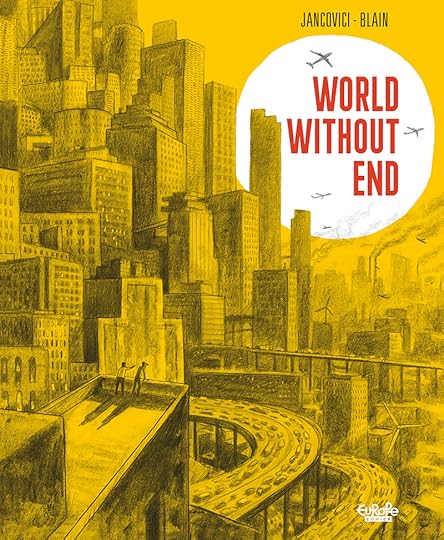 Cover of “World Without End” © Jean-Marc Jancovici, Christophe Blain / Dargaud 2021
Cover of “World Without End” © Jean-Marc Jancovici, Christophe Blain / Dargaud 2021In France, World Without End had a large impact on readers. Released in October 2021, the graphic novel has been a tremendous success with 380,000 copies sold and at least ten reprints. For the year 2021, it finished in the top ten bestselling comic books and graphic novels, alongside classics like Asterix & Obelix, Blake & Mortimer, and Blacksad. Its success reveals the public’s growing interest in the climate and global warming at a time when the health of the environment has become a major concern and a matter of life and death for many.
Rather than denying what awaits us, Christophe Blain and Jean-Marc Jancovici do a deep dive into the environmental issues we are facing. They also show what challenges these issues present to our contemporary globalized societies. World Without End takes the shape of a graphic documentary which brings together precise information and analysis on the evolution of our relationship with energy…
…click on the above link to read the rest…

